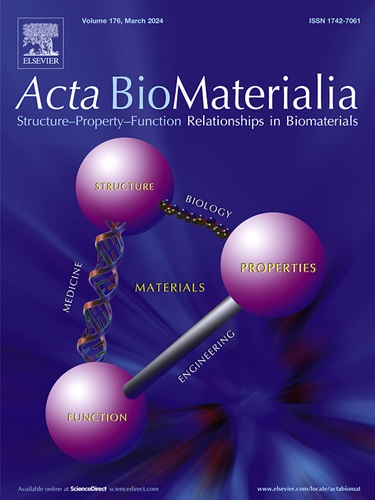Neutrophil-like cell membrane-coated metal-organic frameworks for siRNA delivery targeting NOX4 to alleviate oxidative stress in acute ischemic injury
IF 9.4
1区 医学
Q1 ENGINEERING, BIOMEDICAL
引用次数: 0
Abstract
Although reperfusion is the most effective treatment for acute ischemic stroke, it often results in serious secondary ischemia/reperfusion (I/R) injury due to oxidative stress. This oxidative stress primarily results from the overproduction of reactive oxygen species (ROS) during reperfusion which, in turn, is largely induced by high expression of NADPH oxidase 4 (NOX4). Inhibiting NOX4 gene expression has therefore been proposed as a direct approach to reduce ROS production and promote angiogenesis. Recognizing both the potential of siRNA-based therapies for selective gene silencing and the critical role of neutrophil-endothelial interactions during I/R injury, here we present a unique therapeutic approach where neutrophil-like cell membrane coated porous metal-organic framework nanoparticles are loaded with siNOX4 (M-MOF-siNOX4) and designed to target damaged brain microvascular tissue. These then mitigate oxidative stress by suppressing NOX4 expression. Using an in vitro oxygen-glucose deprivation/re-oxygenation model, we demonstrate that M-MOF-siNOX4 nanoparticles specifically bind to activated endothelial cells, effectively reducing NOX4 expression, decreasing both ROS production and cell apoptosis, and restoring cell viability. Use of an in vivo mouse model of middle cerebral artery occlusion further confirmed M-MOF-siNOX4 nanoparticles to substantially alleviate brain damage and protect neurological function following ischemic stroke. Taken together, our study presents an innovative and effective siRNA-based strategy for reducing oxidative stress in ischemic stroke therapy.
Statement of significance
Ischemia/reperfusion (I/R) injury, a major complication of acute ischemic stroke, is primarily driven by oxidative stress due to the excessive production of reactive oxygen species (ROS). Current treatments targeting oxidative stress and cell death often lack specificity, leading to off-target effects. This study introduces an innovative nanoparticle-based therapy using neutrophil-like cell membrane-coated metal-organic frameworks (MOFs) to deliver siNOX4, an siRNA targeting NOX4, a key ROS-producing enzyme. This approach enhances targeted delivery, reduces ROS production and cell death, and significantly improves neurological recovery in stroke models. By overcoming the limitations of existing therapies, this strategy holds strong potential for revolutionizing ischemic stroke treatment and addressing other disorders related to oxidative stress.

中性粒细胞样细胞膜包裹金属有机框架siRNA递送靶向NOX4减轻急性缺血性损伤中的氧化应激。
虽然再灌注是治疗急性缺血性脑卒中最有效的方法,但由于氧化应激,再灌注常导致严重的继发性缺血/再灌注(I/R)损伤。这种氧化应激主要是由于再灌注过程中活性氧(ROS)的过量产生,而ROS又主要是由NADPH氧化酶4 (NOX4)的高表达引起的。因此,抑制NOX4基因表达被认为是减少ROS生成和促进血管生成的直接途径。认识到基于sirna的选择性基因沉默疗法的潜力以及中性粒细胞-内皮细胞在I/R损伤期间相互作用的关键作用,我们提出了一种独特的治疗方法,即中性粒细胞样细胞膜包裹多孔金属有机框架纳米颗粒,装载siNOX4 (M-MOF-siNOX4),并设计用于靶向受损的脑微血管组织。然后通过抑制NOX4的表达来减轻氧化应激。通过体外氧-葡萄糖剥夺/再氧合模型,我们证明M-MOF-siNOX4纳米颗粒特异性结合活化的内皮细胞,有效降低NOX4的表达,减少ROS的产生和细胞凋亡,恢复细胞活力。大脑中动脉闭塞小鼠体内模型进一步证实了M-MOF-siNOX4纳米颗粒可显著减轻缺血性脑卒中后的脑损伤和保护神经功能。综上所述,我们的研究提出了一种创新和有效的基于sirna的缺血性卒中治疗中减少氧化应激的策略。意义声明:缺血/再灌注(I/R)损伤是急性缺血性卒中的主要并发症,主要由氧化应激引起的活性氧(ROS)过量产生。目前针对氧化应激和细胞死亡的治疗往往缺乏特异性,导致脱靶效应。本研究介绍了一种基于纳米粒子的创新治疗方法,使用中性粒细胞样细胞膜包裹金属有机框架(mof)来递送siNOX4,一种靶向NOX4的siRNA, NOX4是一种关键的ros生成酶。这种方法增强了靶向递送,减少了ROS的产生和细胞死亡,并显著改善了脑卒中模型的神经恢复。通过克服现有疗法的局限性,该策略具有革命性的缺血性卒中治疗和解决与氧化应激相关的其他疾病的强大潜力。
本文章由计算机程序翻译,如有差异,请以英文原文为准。
求助全文
约1分钟内获得全文
求助全文
来源期刊

Acta Biomaterialia
工程技术-材料科学:生物材料
CiteScore
16.80
自引率
3.10%
发文量
776
审稿时长
30 days
期刊介绍:
Acta Biomaterialia is a monthly peer-reviewed scientific journal published by Elsevier. The journal was established in January 2005. The editor-in-chief is W.R. Wagner (University of Pittsburgh). The journal covers research in biomaterials science, including the interrelationship of biomaterial structure and function from macroscale to nanoscale. Topical coverage includes biomedical and biocompatible materials.
 求助内容:
求助内容: 应助结果提醒方式:
应助结果提醒方式:


